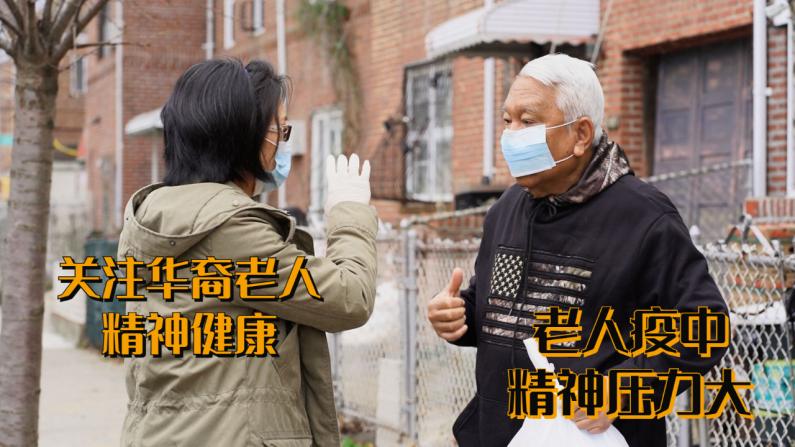
华裔老人中心缩减服务艰难支撑 老人疫中精神压力大
“疫情持续了那么久,对于老人,对于子女,精神压力都是很大的。”布鲁克林喜悦之家老人中心负责人陈丽娜说起疫情中的会员们,忧虑之心溢于言表。
一直以来都从事社区服务工作的陈丽娜,在2012年开始了喜悦之家老人活动中心的工作,为居住在布鲁克林羊头湾U大道附近的华裔老人,提供生活照料和娱乐聚会的场所。“我们这里最多的时候大约有100名会员,像一个联合国,大家都是来自不同国家的华裔,说中文、英文、广东话、越南语、印度尼西亚语,各种都有。”陈丽娜说中心除了为老人安排午餐、帮助他们处理文件,还定期有许多活动:“周一我们有英文课、周二一起跳尊巴舞、周三有唱民族歌曲、周四是唱粤剧、周五练太极和气功,周六还有民族舞,周日也有气功。”中心还组织会员们外出旅游,拍了许多照片贴在墙上。
然而去年三月开始的疫情,改变了所有老人的生活,也让活动中心的经营举步维艰。“一开始我们的员工都没法来上班。”陈丽娜说,疫情开始的时候,大家都非常紧张,好在从中国大陆学习了不少经验。陈丽娜说,自己之前就担心疫情会蔓延到美国,到纽约,她提前做了许多准备,包括准备防疫物品、存储食物等等。当政府宣布老人中心关闭时,他们仍可以为有需要的会员送餐。
不过无论是谁,都没有想到疫情持续的时间如此之久。“疫情给老人和他们的家人带来很大的精神压力。”陈丽娜说,他们每天给老人送餐,会发现因为被困在家里,害怕出行,许多老人都衰老得很快:“有些原来是拄拐杖的,现在要坐轮椅了,有些腿部的功能也有退化萎缩,精神也差了很多,因为之前来中心,有朋友,有活动,老人们有精神寄托,现在好像在数着日子过。”有些会员会在一天里给中心打十几次电话,询问什么时候中心可以开放,可以回到原来的日子。
“我们现在给我们的会员提供一些远程服务,比如打电话陪他们玩游戏,缓解他们的焦虑。”陈丽娜说,尽管非常艰难,许多老人还是努力乐观,保持生活节奏。Oo先生和太太都是中心会员,他们就住在离开中心不到5分钟的街上。“我很担心新冠病毒,我每天都看电视新闻,我要保护我自己和我的家人。”Oo先生说。Oo太太则说,尽管不能出门,夫妇俩努力寻找生活乐趣:“烹饪、打扫、娱乐,我和我先生一起,我们听音乐、看电影、锻炼身体。”一年多前丈夫病逝的古阿姨则更想念中心的活动:“我好喜欢去中心,因为那里有很多老朋友,还有唱歌比赛,我总是拿冠军。”
“其实我们自己现在也是数着日子,吊着盐水。”陈丽娜感叹。她介绍从疫情开始,保险公司为中心提供的资金减少了70%,有些保险公司甚至不愿意让中心为耆老提供中式的餐点。“有些公司他们自己有签约的送餐机构,送一些西餐,但每个文化有不同的习惯,许多华裔老人吃惯了中餐,还是希望能够吃中餐。”此外,中心偶尔会获得政府补助小商业的资金,但也是勉力维持着运转。“真希望疫情快点过去。”陈丽娜说。
Seniors experience Mental Stress due to the closure of Chinese American Senior Centers
"The pandemic has lasted for so long. For the elderly and their families, there is a great mental stress." Lina Chen, the head of the HappyHouse Adult Daycare Center in Brooklyn, expressed her worrisome of their senior members.
Lina, who has been engaged in community service work for a long time, started the Happy House Adult Daycare Center in 2012, providing living care and entertainments for Chinese American elderly living near U Avenue in Sheepshead Bay, Brooklyn. "We had about 100 members at peakwere here, there were about 100 members. Everyone is of Chinese descent from different countries. They speak different languages like Chinese, English, Cantonese, Vietnamese, Indonesian and so on." Chen Lina said that the center is not only to provide lunches to the members, or helping them deal with documents, it also arranges many activities regularly: "We have English class on Mondays; Zumba dance on Tuesdays; we sing folk songs on Wednesdays; Cantonese opera on Thursdays; and practice Tai Chi and Qigong on Fridays. There are also dance and qigong classes during the weekends." The center also brought members out for field trips. Staff took many photos for the seniors and posted them on the walls.
The pandemic started from March last year changed the lives of all the elderly and made the operation of the senior center severely difficult. "In the beginning, none of our staff were able to come to work." Lina recalled that everyone was very nervous about COVID at that time. Fortunately, she learned from the experience of people in mainland China deal with the pandemic. Lina said she prepared PPE in advance and also stocked a big amount of foods. When the government announced the closure of many businesses including senior centers and restaurants, the Happy House could still deliver meals to members in need.
The pandemic lasted longer than anyone expected. "This pandemic has brought a lot of mental pressure to the elderly and their families." Lina said. When they delivered meals to the elderly they found that their members were much aged because they are trapped at home and lack of exercises and communicating: "Some of the seniors who were on crutches are now in wheelchairs, and some are experiencing deteriorated motor functions in the legs. But more importantly, this is a very hard time for our members mentally. “Our members used to come to the center regularly, there were friends, activities, and that provided mental support for them. Now they are counting their days. Some members will call the center more than a dozen times a day, asking when the center will open and when can they return to the original days.” Lina said.
"We are now providing some remote services to our members, like calling them to play games to ease their anxiety." Lina said that despite the difficulties, many elderly people still try to stay optimistic and maintain the pace of life. Both Mr. Oo and Mrs. Oo are members of the center, and they live on the street less than 5 minutes away from the center. "I am very worried about the virus. I watch TV news every day. I want to protect myself and my family." Mr. Oo said. Mrs. oo said that even though they could not go out, the couple tried their best to find the joy of life: “Cooking, cleaning, entertainment, my husband with me, we listen to music, watch movies, and exercise.” Madam Gu, whose husband passed away about a year age miss the center even more: "I really like going to the center because there are many old friends and there are singing competitions. I always win the championship."
"In fact, we ourselves are counting the days, struggling to survive as well." Lina sighed. She said that since the beginning of the pandemic, the funds provided by insurance companies to the center have been reduced by 70%, and some insurance companies are not even willing to let the center provide Chinese meals for the elderly. "Some companies have their own contracted food delivery agencies to deliver American food, but each culture has different eating habits. Many Chinese seniors are used to Chinese food, they still want to eat Chinese food." Lina said the center received government subsidies for small businesses, but far from enough for running a big spacious place like HappyHouse adult daycare center. "I really hope the pandemic will be over soon." Lina said.